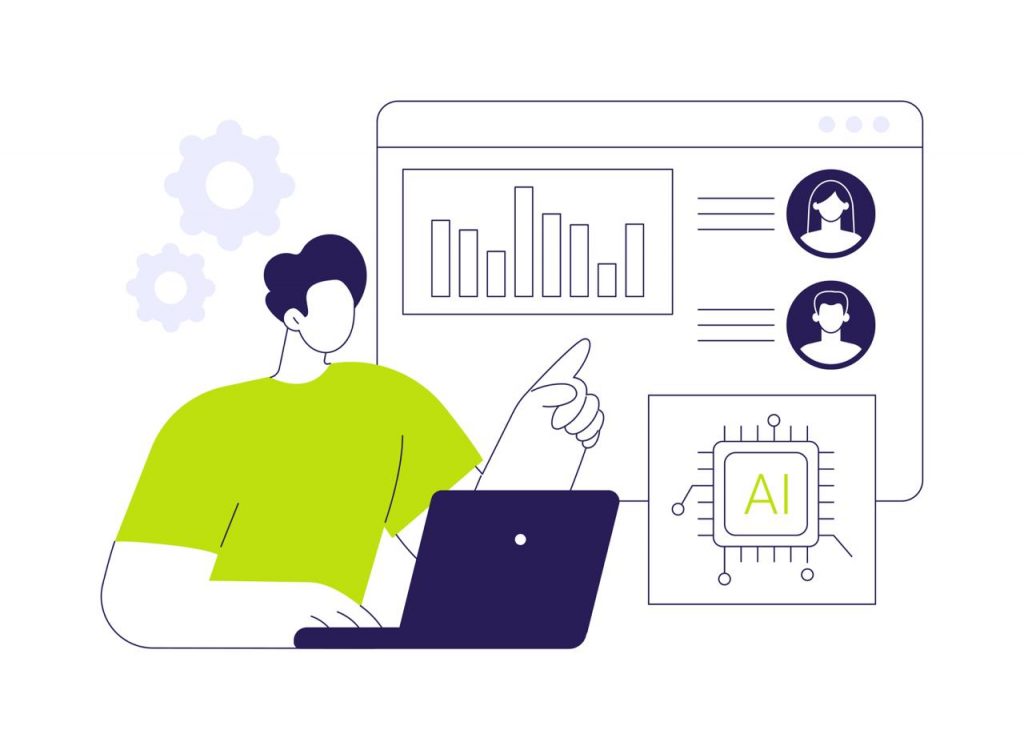AI is changing the way businesses connect with customers. With tools like ChatGPT and machine learning, companies can now create smarter, faster, and more targeted campaigns. Whether you’re a small business owner or a global brand, AI in marketing isn’t just the future—it’s the now.
The rise of artificial intelligence in marketing is being driven by rapid advances in data processing, automation, and predictive analytics. AI marketing strategies are no longer optional—they’re essential for staying competitive. From personalized email campaigns to AI-powered customer insights, brands that integrate AI into their digital marketing strategies gain a clear edge.
This article will break down what AI marketing is, explore its core benefits, and show how it’s revolutionizing everything from content creation to advertising. Whether you’re curious about generative AI in marketing or seeking an AI marketing agency to boost your brand, you’re in the right place. Let’s dig into how AI is transforming the marketing landscape today.
What is AI Marketing?
AI marketing is the use of artificial intelligence technologies to automate, optimize, and personalize marketing tasks and strategies. From generating content to predicting consumer behavior, AI is transforming how marketers operate. By processing massive amounts of data in real-time, AI tools can make decisions that would take humans hours—or days.
These systems rely on machine learning (ML), natural language processing (NLP), and data analytics to deliver more targeted, efficient marketing campaigns. AI for marketing goes beyond automation—it’s about intelligence. It’s about making decisions based on patterns, behaviors, and insights that humans can’t detect on their own.
For example, AI marketing tools can track how users interact with a website, identify the best time to serve ads, and generate high-performing headlines using data-backed insights. AI PPC management platforms optimize ad bids in real-time, while content creation AI tools develop engaging content tailored to your audience segments. AI in marketing also plays a crucial role in customer journey mapping, uncovering exactly how and when to engage a lead.
AI marketing isn’t limited to digital platforms. It’s also integrated into in-store experiences, voice search, and connected devices, offering a truly omnichannel approach. Whether it’s through predictive analytics, AI marketing analytics dashboards, or AI-generated marketing content, the technology empowers businesses to deliver relevant, timely, and effective messaging across every touchpoint.
As the technology matures, we’re also seeing the rise of AI marketing agencies and platforms specializing in artificial intelligence advertising and campaign management. These firms help companies leverage AI tools to cut through the noise and gain a competitive advantage. AI isn’t replacing marketers—it’s supercharging them.
The Benefits of Implementing AI
Adopting AI in marketing delivers clear, measurable advantages across industries. Here’s how it’s reshaping the way brands operate:
- Efficiency: AI handles time-consuming tasks such as scheduling social media posts, crafting email campaigns, and analyzing campaign performance. This frees up teams to focus on strategy, creativity, and innovation.
- Hyper-Personalization: Traditional segmentation is broad. AI enables ultra-specific targeting by analyzing behavior, preferences, demographics, and purchase history. It delivers real-time personalization—from product recommendations to dynamic pricing.
- Data-Driven Accuracy: AI systems can process enormous datasets and detect trends humans might overlook. This improves campaign performance, ROI, and customer satisfaction. Marketing decisions become guided by hard data, not guesswork.
- Lower Operational Costs: By automating repetitive tasks like reporting, A/B testing, and customer segmentation, businesses can cut down on overhead and reduce their reliance on large marketing teams.
- Predictive Capabilities: AI doesn’t just explain what happened—it forecasts what’s coming. Marketers can anticipate user behavior, detect churn risks, and launch timely interventions.
- 24/7 Engagement: Chatbots and virtual assistants powered by AI offer continuous customer interaction, lead qualification, and support without downtime.
- Faster Scaling: AI marketing platforms allow businesses to scale campaigns across channels and geographies without needing to dramatically increase resources.
For companies at any size—from startups to enterprises—AI marketing solutions offer a path to smarter growth and stronger customer relationships.
How Can AI in Marketing Help Me Reach My Customers and Personalize Their Experience?
AI for marketing revolutionizes how brands connect with customers by delivering real-time, personalized experiences at scale. Here’s how it sharpens targeting and enhances engagement:
- Customer Segmentation: AI tools analyze user data—click patterns, purchase behavior, social media activity—and divide audiences into highly refined segments. Each segment receives content tailored specifically to their interests and needs.
- Personalized Content Delivery: Content creation AI generates messages that resonate with each segment. Dynamic emails, smart landing pages, and personalized product recommendations are all driven by AI.
- Behavioral Triggers: AI systems monitor user actions and respond with relevant content or offers. For example, if a user abandons their cart, AI can automatically trigger a personalized reminder with a discount to re-engage them.
- Omnichannel Personalization: AI ensures consistency across platforms. Whether a customer browses on mobile, interacts via email, or shops in-store, the messaging remains aligned and relevant.
- Real-Time Adjustments: Unlike static campaigns, AI-powered marketing tools can modify messages on the fly based on live user data, increasing the likelihood of conversions.
The result is a more engaging customer journey—from the first click to long-term loyalty. Using AI in marketing lets brands be more relevant, timely, and human—even at scale.
How Is Artificial Intelligence Used in Marketing?
AI is deeply embedded across the marketing ecosystem, transforming how brands connect, communicate, and convert. Here’s an in-depth look at how artificial intelligence is being used in marketing today:
Social Media Listening
AI tools use natural language processing (NLP) to monitor platforms like X.com, Instagram, and LinkedIn. They identify trends, gauge sentiment, and analyze public opinion at scale. This lets marketers understand how their brand is perceived, spot PR crises before they blow up, and uncover new content opportunities from trending conversations.
Content Generation
AI-powered platforms such as ChatGPT, Jasper, and Copy.ai are now capable of generating human-like copy for various formats. These tools help marketers produce social posts, product descriptions, ad copy, and long-form articles quickly and affordably. Some systems even A/B test content variations and optimize headlines for better engagement.
Automation
AI streamlines complex workflows—from email drip campaigns and retargeting ads to lead nurturing and CRM updates. This kind of automation ensures timely, relevant communication across touchpoints without constant human oversight. Marketers can also schedule and personalize campaigns in advance, with AI optimizing timing and channel based on user behavior.
Audience Segmentation and Personalization
AI-driven segmentation goes beyond age or location. It clusters users based on micro-behaviors, purchase history, and interests. These clusters then receive hyper-personalized messaging. For example, an online clothing retailer might use AI to show different homepage banners or product recommendations based on gender, style preferences, and browsing history.
Data Analysis for Customer Insights
AI digests data from websites, CRMs, social platforms, and sales pipelines to uncover what drives user behavior. It visualizes customer journeys, highlights bottlenecks, and flags opportunities. Tools like Google Analytics 4 and HubSpot AI empower marketers to act quickly and confidently on insights that would take weeks to discover manually.
Reputation Management
AI doesn’t just scan social media for brand mentions. It can detect sarcasm, sentiment polarity, and intent. It notifies marketing and PR teams about negative chatter or ratings so they can respond with appropriate messaging or mitigation strategies in real time.
Competitive Intelligence
AI tools continuously monitor your competitors’ content, SEO rankings, ad creatives, social engagement, and pricing. This data helps marketers benchmark performance, uncover white space, and craft sharper messaging that stands out in crowded markets.
Multilingual Advantage
Global marketers use AI translation and localization tools to reach international audiences. Advanced models go beyond direct translation and adapt tone, phrasing, and cultural nuances to create content that feels native—crucial for building trust and engagement worldwide.
Customer Service Assistants
AI chatbots now answer complex questions, process returns, and even upsell customers—all without human help. Powered by NLP and machine learning, these bots evolve with every interaction. They reduce customer wait times, lower support costs, and maintain brand voice consistently across touchpoints.
E-Commerce
AI powers dynamic product recommendations, search filters, and virtual shopping assistants. On sites like Amazon, users see different product arrangements based on their unique shopping behavior. AI also drives real-time inventory updates, pricing changes, and checkout personalization.
Predictive Analytics
AI can predict a user’s next move based on historical behavior. Will they buy again? Are they likely to unsubscribe? With these insights, marketers can trigger preemptive campaigns—like a loyalty reward for someone likely to churn or a bundle offer for high-intent shoppers.
Programmatic Advertising
Instead of manually managing ad buys, AI handles programmatic advertising by bidding in real-time on digital ad inventory. These systems analyze user data, context, and past performance to serve the most effective ad at the optimal price, increasing ROI and minimizing wasted spend.
Search Engine Optimization (SEO)
AI tools like Clearscope, Surfer SEO, and SEMrush suggest improvements to keyword targeting, meta descriptions, and internal linking. They analyze SERP trends and even predict how algorithm updates might impact visibility—helping marketers future-proof their content strategy.
Workflow Automation
AI platforms like Zapier, Notion AI, and Asana integrate tasks, data, and people across the marketing stack. Whether it’s updating spreadsheets, flagging overdue tasks, or compiling weekly reports, AI cuts the friction and keeps teams focused on growth.
Bringing It All Together
These tools and techniques aren’t isolated—they work in harmony. AI creates a fully connected marketing system where each touchpoint feeds the next. Social data informs ad targeting. CRM data drives personalized content. Predictive analytics shapes the timing of every interaction. The result is a flywheel effect that makes your entire strategy faster, smarter, and more effective.
As the landscape becomes increasingly data-driven and customer expectations continue to rise, AI is no longer optional. It’s the competitive edge every marketer needs to thrive in a world of constant change.
Which AI Technologies Enable Marketing?
A wide range of AI technologies serve as the foundation for modern marketing innovation. These tools are not just buzzwords—they are the engines behind personalized ads, intelligent automation, and predictive insights.
Machine Learning (ML)
Machine learning is the backbone of most AI marketing tools. It trains algorithms to learn from patterns in large datasets. Over time, ML systems become more accurate in predicting outcomes like customer churn, product preferences, or the best time to send an email. Machine learning also fuels dynamic pricing, fraud detection, and lookalike audience creation in ad platforms.
In essence, ML allows marketers to shift from reacting to predicting, turning insights into action automatically. Whether it’s optimizing ad spend in real-time or determining which content to promote, machine learning is what makes AI tools continually smarter.

Natural Language Processing (NLP)
NLP allows AI to understand, interpret, and generate human language. It’s the secret sauce behind AI content creation, intelligent chatbots, voice assistants, and automated sentiment analysis.
With NLP, marketers can analyze thousands of social posts, reviews, and customer support tickets to spot trends or pain points. It also powers tools like ChatGPT, which can draft blog posts, emails, or social media content that sounds like a real person wrote it. As voice search grows, NLP becomes vital for optimizing content for how people speak, not just how they type.
Semantic Search
Semantic search changes the game for both SEO and on-site search engines. Instead of relying solely on keyword matching, semantic search understands the intent behind a query. It uses context, user history, and related concepts to surface more relevant content.
For marketers, this means better visibility in search engines and improved user experience on their websites. Tools like Google’s BERT and other transformer models have made semantic search a standard part of content optimization.
Named Entity Recognition (NER) and Neural Networks
NER extracts important information—like names, dates, brands, and locations—from unstructured text. Combined with neural networks, it enables AI to recognize meaningful data within massive content streams.
Neural networks—especially deep learning models—are the driving force behind image recognition, recommendation engines, and behavior prediction. They mimic the structure of the human brain and can process data with incredible nuance, making them essential for marketing tasks that require context and adaptability.
Together, NER and neural nets help marketers track brand mentions, analyze competitor content, or deliver highly personalized experiences based on subtle behavior cues.
Sentiment Analysis
Sentiment analysis detects emotions behind text—positive, negative, or neutral. Marketers use this to measure campaign impact, spot PR risks, and understand how audiences feel about a product or brand in real-time.
Advanced sentiment tools can even recognize sarcasm, urgency, or customer frustration, which can trigger instant responses or support interventions. For brands with large audiences, this tech is invaluable for maintaining reputation and building trust.
Why It Matters
These technologies are not just behind-the-scenes magic—they’re transforming how marketing works at its core. They enable marketing teams to be faster, smarter, and more precise, helping brands cut through the noise and build meaningful connections at scale.
Without these AI foundations, modern digital marketing would stall. With them, marketers can predict trends, engage users with perfect timing, and scale personalization in ways never before possible.
How Using AI in Marketing Can Improve ROI
AI drives better ROI by making marketing smarter, faster, and more efficient. It streamlines campaigns, automates repetitive tasks, and delivers real-time insights, reducing wasted spend. AI algorithms analyze customer behavior, predict buying intent, and segment audiences precisely—helping marketers target the right people with the right message at the right time.
Predictive analytics allows brands to allocate budgets more strategically based on forecasted performance. AI also fine-tunes ad placement and bidding strategies in programmatic advertising, cutting acquisition costs while boosting conversions.
Content generation tools speed up production while ensuring relevance, improving engagement rates. Meanwhile, AI-powered chatbots and assistants enhance customer experience, leading to higher retention and lifetime value.
In short, AI helps marketers work smarter—not harder—by removing guesswork and replacing it with actionable data, leading to measurable returns on every dollar spent.
What Are the Challenges of AI in Marketing?
While AI offers massive potential, it’s not without challenges—especially when it comes to implementation, oversight, and ethics.
Data Quality and Availability
AI is only as good as the data it’s trained on. Incomplete, biased, or outdated data can lead to flawed insights, poor targeting, and missed opportunities. Many businesses struggle with data silos, inconsistent tracking, or a lack of clean historical data to feed their AI systems.
Complexity and Integration
AI tools can be difficult to integrate into existing marketing stacks. Without the right technical infrastructure or skilled talent, businesses may face long setup times, steep learning curves, and underutilized tools.
Lack of Human Oversight
Over-reliance on automation can backfire. AI can make poor decisions without human judgment, especially in sensitive areas like tone of voice, personalization, or public-facing responses.
Privacy and Ethical Concerns
AI often relies on personal data to function effectively, raising issues around privacy, transparency, and compliance with regulations like GDPR or CCPA. Marketers must tread carefully to maintain consumer trust and avoid legal risks.
Cost and Resource Investment
Although AI can drive long-term ROI, the upfront cost of advanced tools, training, and infrastructure can be high—especially for small businesses.
In short, AI in marketing isn’t a plug-and-play fix. It requires careful planning, ongoing monitoring, and a strong ethical framework to deliver on its promise without creating new problems.
AI Marketing Tools Spotlight
With hundreds of AI marketing tools available, choosing the right ones can feel overwhelming. Here’s a breakdown of standout platforms across key categories, helping marketers drive efficiency, creativity, and performance.
Content Creation & Copywriting
- ChatGPT / Jasper / Copy.ai: These generative AI tools help marketers quickly create blog posts, email campaigns, product descriptions, and social media content. They reduce time-to-publish while keeping messaging consistent and engaging.
- Writesonic: Offers AI-generated copy tailored to different tones, platforms, and audiences—great for ad creatives or landing pages.
Customer Engagement & Chatbots
- Drift / Intercom: These AI-powered chatbots handle FAQs, lead qualification, and customer support 24/7. They use NLP to understand queries and guide users through personalized journeys.
- Tidio: Ideal for smaller businesses, it combines live chat with AI-driven responses to boost engagement and conversions.
Email & Personalization
- Seventh Sense / Persado: AI analyzes open rates, engagement data, and send-time behavior to optimize email campaigns. Persado also crafts subject lines and CTAs based on emotional response data.
- Dynamic Yield: Offers advanced personalization by adjusting website content, product recommendations, and offers based on user behavior in real time.
SEO & Content Optimization
- Surfer SEO / Clearscope: These tools help writers optimize content by analyzing top-performing pages and suggesting keywords, structure, and formatting improvements that boost rankings.
- MarketMuse: Uses AI to audit existing content, find gaps, and recommend new topics to improve search authority.
Paid Media & Programmatic Advertising
- Albert.ai / Pattern89: These platforms optimize ad spend by analyzing performance data, adjusting bids, and creating variations of creatives that convert better.
- Revealbot: Automates ad management for platforms like Facebook and Google Ads, making real-time budget and placement decisions.
Analytics & Forecasting
- Crimson Hexagon / Tableau AI / PaveAI: Turn complex data into actionable marketing insights using AI to identify patterns, forecast trends, and refine strategy.
Whether you’re building smarter content, automating campaigns, or decoding your data, AI tools are essential to modern marketing success. The key is selecting the ones that align with your goals—and learning how to wield them effectively.
A Step-by-Step Guide to Incorporating AI into a Marketing Strategy
Incorporating AI into your marketing isn’t just about buying the latest tool—it’s about strategic integration. Here’s how to do it step by step:
Step 1: Define Your Marketing Goals
Start with clarity. Are you aiming to boost conversions, improve personalization, automate workflows, or gain customer insights? Your goals will determine which AI technologies to focus on.
Step 2: Audit Existing Tools and Data
Review your current marketing stack and assess the quality and availability of your data. AI needs clean, structured data to function. Identify gaps in tracking, attribution, or customer segmentation.
Step 3: Identify High-Impact Use Cases
Focus on use cases that align with your goals and offer quick wins—like using AI for email personalization, ad optimization, or chatbot-driven customer service. Look at examples like IBM’s Watson AI, which helps brands predict customer churn and improve campaign targeting.
Step 4: Choose the Right Tools
Don’t get overwhelmed by options. Select tools that integrate well with your CRM and marketing platforms. For example, Adobe Sensei for personalization or ChatGPT for scalable content creation.
Step 5: Start Small and Scale
Implement AI in a limited campaign or channel. Measure results. If the impact is positive—lower CPA, higher engagement, improved retention—expand its use.
Step 6: Train Your Team
AI isn’t “set it and forget it.” Marketers must understand how to use the tools, interpret the outputs, and adjust strategies accordingly. Invest in training or partner with AI-savvy consultants.
Step 7: Monitor and Optimize
Track KPIs continuously. Use A/B testing, feedback loops, and analytics to improve performance. AI will only get smarter the more data it’s fed and the better it’s refined over time.
Step 8: Stay Ethical and Transparent
Ensure your AI strategy complies with privacy laws and ethical standards. Be transparent with users about data use, personalization, and automation.
By taking a structured, intentional approach, AI becomes more than a buzzword—it becomes a revenue driver.
What’s Ahead for AI in Marketing
The future of AI in marketing is dynamic and deeply transformative. As the technology matures, expect it to move from assisting marketers to actively driving strategy.
Computer vision is enabling brands to analyze images and video at scale—for example, tracking how users interact with products on social media or identifying objects in user-generated content for UGC campaigns.
AI chatbots will evolve from basic customer service reps to full-scale sales agents capable of handling complex conversations, cross-selling, and relationship-building with contextual awareness.
Predictive and prescriptive AI will go beyond forecasting behavior to recommending exact actions marketers should take next. This includes prescriptive analytics that suggest campaign adjustments, budget reallocation, or new audience targeting based on real-time data.
Responsible AI will become non-negotiable. Consumers and regulators alike will demand more transparency, accountability, and fairness in AI-driven decisions. This will influence how data is collected, models are trained, and marketing automation is deployed.
AI is no longer just a tool—it’s shaping the marketing teams of tomorrow, redefining the relationship between data, creativity, and customer experience.




